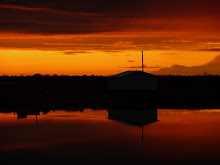Sea ice can exist only where it is cold enough to form. According to what we know about salt water freezing that is a cold place indeed. Colder climate means greater struggle for plants to grow upright. Smaller plants tend to not lend themselves to mass farming techniques. Hence, you are more likely to have a nomadic culture of hunters and gatherers.
“*Why are the effects of climate change more dramatic in the Arctic than lower latitudes?” We have explored how important the Poles are to our planet. If you have ever lived near the Tundra you have had the chance to see how destructive simple things are to the land. I believe climate change seems much more dramatic also because of the fact the Arctic has no landmass to support it. It is all salty sea-ice. It has to be colder to freeze. If it is -5C and warms even just a few degrees, the ice is melting. Not only is the local climate and cultures going to suffer but it will eventually effect all.
“*Are there elders in your area who have a sense of local now and ice dynamics?” Barb (who is also in this class) has said that she has met people who have said that it is getting harder to “read” the ice. I have also heard local village Elders saying that it is not as cold as it use to be. I have heard a few concerns about an early and more dangerous break-up this year because of the warm winter and thinner ice.
I tried to find some local stories about ice, how it forms, why it forms, but so far I haven’t had any luck. I have skimmed several books of Yupik stories and asked some of the people I know about ice. The best story told to me that had anything to do with ice in a round-about-way was about two very powerful salmon that wanted it to stay winter for much longer than it was going too. They used their considerable power to make it so. The bugs did not like this; they wanted warmer weather so that they could come out. The bugs banned together to overpower the salmon. They might have been small but by working together with their greater numbers they won the fight. Another piece of local knowledge I have heard about winter this past week is this: When there is less snow and ice on the ground then the coming year will have few berries. I suppose this is because the berries are not as well insolated from the cold.
The Discovery Channel is starting two shows this week. One will start Sunday. It is produced by the same people who did Planet Earth. It is called Life. The second is called Atlas 4D. My understanding is that the first episode, on Monday night, will explore the “connections of the lands, people and animals of the Rift Valley”. Sounds like they had this class in mind!
Subscribe to:
Post Comments (Atom)


The salmon and the insects...great story!
ReplyDelete